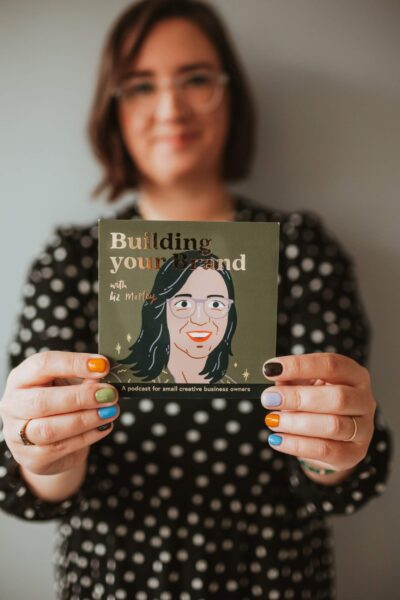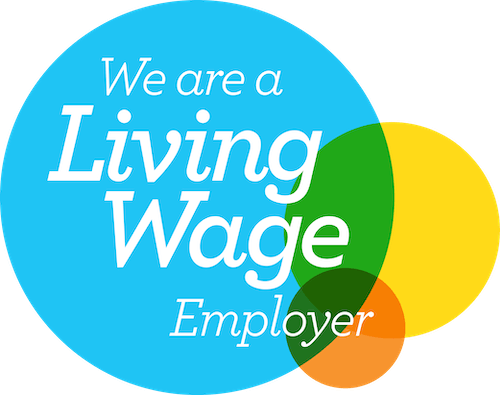It’s happened to all of us – we’ve been searching for a particular service, come across a company who might do the job, and then quickly closed the tab on their website after reading something we didn’t like.
That’s a sales pitch ick, my friend; something that puts us off buying from a business.
And as much as we love guiding small businesses to do things right, sometimes it’s kinda fun to highlight how not to do things.
We asked the lovely members of our Studio Cotton Clubhouse and followers of Studio Cotton on Instagram to reveal to us what website sales pitches give them the ick, and ohhhh boy, they were more than happy to tell us.
1. A sales pitch full of waffly words
Using lots of beautiful, fluffy words can make a website sound whimsical and enticing, but are any of those words explaining what the business actually does?
If a service page reads something like, “we help you elevate your business with soul and intuition” for 700 words without any information about what the service entails, potential customers are likely to close the tab.
Long, waffly content often uses 100 words when a simple 15 would have done the job, and could make it seem like the writer is burying something.
Most people will want to know from the sales pitch exactly what they’re buying, who they’re investing in, and what they’re likely to gain from the service.
That fluffily-worded sales pitch would be better with more specificity (plus a lil fluff) such as “soul-led business coach and mentor” or, “you’ll get a 10-point plan to improve the SEO of your gorgeous small business website”.
Without specification (whether it’s the product itself or of the experience, qualifications, and skills of person providing it) it also makes it really tricky to compare two services from different providers.
“Saying a lot without actually saying anything. When you are spoken to in a way that sounds really appealing and enticing but there is actually nothing practical or tangible.”
Imogen Partridge, Imogen Partridge Illustration & Design
“Waffle! Just get to the point. I am so time poor I just want to know what and how much as quickly as possible. Stick your life story somewhere later please. Also boring websites. Or ones that are too complicated. Just somewhere in the middle please so I don’t snore to death but my brain doesn’t explode either.”
Fran Harkness, BAM Store + Space
“I don’t like it when businesses dance around what they’re offering and put more effort into memes. When the page is the length of a football field then it’s a massive turn off.”
Stevie, Jeff and the Squirrel
2. And empty promises
People love security, and in this capitalist world, money provides that security. There are so many service businesses out there claiming to help you earn £10k a month – what is it with that number?
Small business owners often fall foul to this, because those sales pitches promise that monetary security, and it can be hard to tell whether a promise is empty.
Generally, if it sounds too good to be true, it probably is. Even if there are sparkling reviews on a website, it’s best to search for some impartial reviews, or ask for recommendations from your small business buds instead.
The great thing about the small business community is that word spreads fast, so if there are empty promises floating about, it won’t be long before everyone knows.
“‘We’ve got you covered’ and other empty cliches. This might be harsh, but when I’m looking for a professional creative, these lazy, overused phrases are such a huge turn off.”
Cat, The Good Book Shop
“Coming from “SEO boosting” companies: when they promise to put me on page one of Google results, as if everyone sees the same results every time… boils my blood :)”
Leonor, Eleanor Shadow
“Phrases like “earn 10k months with our course” that is going to cost me £££, but don’t tell you what’s actually in the course. It gives me that get-rich-quick, MLM ick feeling.”
Sabrine Keir, Studio SK
“Business mentors – “My winning formula – how I had my first £20k month” sort of sales pitches. Yuck. It just stinks of lies to me, even if it’s not…”
Jessica Ord, Positively Pregnant Hypnobirthing
“When a company claims to be an expert at increasing your sales on Etsy. Then you do some digging and find their store, only to see they have had about 10 sales – no thanks.”
Samantha, Making Meadows
3. Poor spelling and attention to detail
This might not be applicable to every website or sales pitch, and may often go unnoticed by many prospective customers, but poor spelling, grammar and a messy website can be a real turn-off to some (me included).
We’re all human and all make mistakes, so it’s worth having a website proof-read by at least one other human. After staring at the same piece of writing for hours, it’s easy to miss silly mistakes.
Alsoooo, I can’t put it better than Aime did in her blog post 7 website features that make me lose trust in a small business…
“If a small business is asking me to spend £627 on their 3-hour workshop (yep, real example), but has an untidy, cluttered, poorly-written, slow and just, well, unprofessional website – I take a step back, because this is getting flaggy.
It’s kinda like walking into a shop to buy a fancy green velvet sofa – but the shop has wine gums on the floor, you can’t walk around without bumping into footstools, and it kinda smells like feet.
Asking me to invest in a high-end service, when the business hasn’t invested in selling it to me, will immediately tear down that trust.”
“Poor spelling. If your service is email marketing assistance, please check your posts and website for spelling errors.”
Jill Schumacher, UASHMAMA UK
“Sounds superficial, but my business is very visual, so good design is important to me. A website that is jarring, has bad photography and is visually unpleasing is a no for me.”
Militza Ortiz, Militza Ortiz Jewellery
“Poor grammar and badly-written copy; it’s a real turn-off for me.”
Jayne, Martha’s Homestore
“When people don’t do what they preach for their own businesses. Eg, social media expert with a crappy Insta page, blog writer with out of date blogs on their site etc…”
Alice Paling, Object Story
4. A sales pitch with no price
Some business owners think that by not sharing the price of their service, they’re building intrigue, focussing on the value (rather than cost), and encouraging people to get in touch to find out the price.
We’re so not into that, because we love best practice website design and UX (user experience), which means providing the most efficient user journey, and most people want to know how much something costs as early as possible.
In addition, people often think that the price isn’t shown, it’s way out of their budget. Pricing doesn’t need to be front and centre in a massive font, it just needs to be somewhere on a service page.
“If I have to read for 20min before you tell me how much the service will cost, I’ve probably already mentally decided to look somewhere else.”
Ramona, Alderdoodle
“No obvious prices. Ew. If it’s variable then at least give me a ballpark or an example of a project to give me some sort of clue. If I have to ask then I assume it’s out of budget.”
Fallon, Seeker Jewellery
“If a service provider doesn’t provide information about the prices of their offering, I’m unlikely to reach out as I don’t want to waste their time or mine if I can’t afford them.”
Natalia Kübler, Pearls & Pomegranates
“Long waffle-y sales pages: promised outcomes, tonnes of reviews & ‘not for you if…’ I whizz past to find no price point. I’m nervous to reach out without the context of price.”
Jordan, Jordan Lily Designs
“Lack of prices or at least price guides. Only people rolling in cash can afford things with no price tags. I am not rolling in cash.”
Bethany, Bethany Robyn Ltd
Get expert website help in our £15 community
A super simple Slack community where you can ask Aime questions, get feedback, and/or join a live session every fortnight.
5. Using off-putting (or exclusive) language
Off-putting or exclusionary language is a big no-no, and can mean prospective customers feel offended or unwelcome, and an entire group of people won’t buy from you.
Aside from it not feeling very kind or inclusive, Under the Equalities Act, a business cannot discriminate against customers because of a protected characteristic, such as age, gender, race or religion, amongst others. Here’s key information copied & pasted from Citizen’s Advice:
The Equality Act 2010 protects [consumers] against discrimination by businesses and other organisations, when they provide you with goods or services.
It doesn’t matter whether you pay for the goods or services, or if they’re free – the trader or service provider still mustn’t discriminate against you.
The law also covers advertising. A trader or service provider can’t advertise that they only serve customers of a certain gender or sexual orientation. A business can advertise that they are ‘gay friendly’, for example, but can’t exclude heterosexual people.
*I just want to put in a massive caveat that I am not a lawyer, so please do not rely on me or Studio Cotton for legal advice – hence the copying & pasting from a much more knowledgeable source.
Whether it’s overly-gendered, overly-friendly, patronising or just incredibly repetitive, the language used in a sales pitch is so important.
“Overly-gendered “girlboss” or “feminine energy” type language, which I find alienating and presumptuous.”
Meg Lovell, Meg Lovell Photography and Film
“Copywriter referring to themselves as your ‘business bestie’. I want a friendly working relationship, not to be best brunch pals.”
Holly Close, Good Egg Digital Marketing
“Repeated use of a phrase. I was trying to watch one course and the person repeatedly used a word to call the viewer which was driving me mad. I ended up switching it off.”
Stef, Forged in Fables
“Patronising messaging aimed at a child/airhead. Yes I want your expertise, but because I’m time poor and don’t have years of experience, not a because I’m a dimwit.”
Laura Roberts, Rock + Realm
6. A sales pitch that’s too salesy
A too-pushy sales pitch can push potential customers away. Y’know what else pushes customers away? Overdoing it with email marketing.
I recently joined a gym, and after going to my first class, received five emails within the space of an hour. That is way too many. It was a contributing factor to me cancelling my membership (along with it always being super busy and bro-y).
When it comes to email marketing, one every week or two is plenty, as sending lots of emails that remain unopened (I’m looking at you, PureGym) is indicative of spam.
I also think that being overly “salesy” in a sales pitch can feel really inauthentic – I can spot it a mile off, and as soon as I feel like I’m being hard-sold to, I’m out. Looks like some of our Clubhouse members feel the same.
“A flashy countdown timer showing when a ‘deal’ on their service is going to end. To me it seems pushy and devalues their service.”
Annie, Green Rooms
“A million emails. I don’t know why anyone thinks sending two emails on the same day about a new offering (or daily emails for many days) will get them customers.”
Marianna, Luneta Creations
“I don’t like random web developers who barge their way into my Website inbox. I find it pushy and intrusive, and I would never go for these companies (though I do need help).”
Mandy Allan, Mandy Allan Drawing
“Action Takers – it implies that people who don’t take fast – i.e, immediately buy – aren’t motivated when it could just be that people need more time to process.”
Deenah, Words To Live By Writing
“When they bombard you with emails. One little sign up and you get about 10 emails a day. I don’t open them. I just delete. The worst one I have had recently sent me texts too.
When they moan about how hard it is to be a small business in the current climate. I don’t want to hear the whinging.
When they guarantee they will get you to be no.1 on Google. Lies!
When they make you feel bad about not being ‘ready to invest’ in your business by taking them up on their offers, and when they ask you if you can afford not to buy their service.”
Melanie, Tangled Roots
7. Using outdated stats or irrelevant examples
The world has had a few pretty dramatic changes between 2019 and 2024, not least when it comes to small businesses.
What worked in 2019 didn’t work in 2020, and what worked during the height of the pandemic in 2020 doesn’t work in 2024, so using outdated stats is kinda silly and pretty misleading.
If a small business owner is investing in a service, they want to know how it will work for their small business now.
“If the example stats are for 2020. So for example; “here’s how I made £200,000 in a year on Etsy”, Cool, but it was 2020 and you could have sold an old sock if you listed it.”
Jodie Bond, The Letter Loft
“I *shudder* when I see service providers using themselves as their example. They’ll share a story of transformation, but they’re the only proof it works. That’s a sample of… one.”
8. A complicated, long-winded website
As mentioned earlier in the blog post, best practice website design and UX means providing the most efficient user journey, and an overly-complicated website is doing the exact opposite.
People are fickle, and if it’s too difficult and too time-consuming to find what they want on a website, they’re more than likely going to abandon it.
I guess some businesses think it’s cool to have a video pop up or a beautifully confusing landing page or an intricate process, but it’s probably costing them.
“I find it frustrating when a video with music pops up on the first page of a website and you have to scramble to mute your computer or delete the web tab.
I find it frustrating when there is some kind of holding page that makes it a puzzle to find where to click to actually enter the site – results in swearing or abandonment”
Mollie, Hutt Decor
“Sales Funnels… I can spot them a mile off 😣 I may already be sold on a service – enough to click on their link for more info, only to find the LONGEST click funnel page 😫😫”
Steph Taylor, Little Big Party Co
While we’re here, have a read through Aime’s previous blog post, 16 frighteningly popular sales tactics that work ghoulishly well (and might just be some bright, blood-red flags) and then you’ll really know how not to write your service pages.























